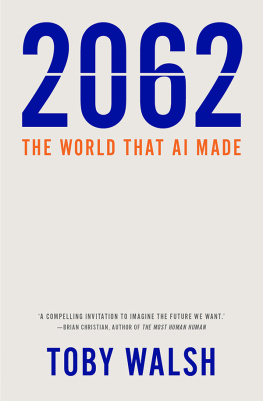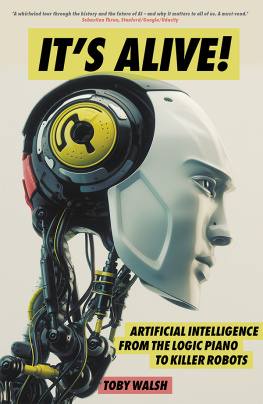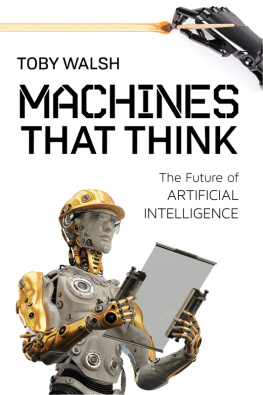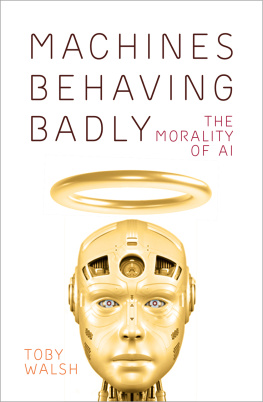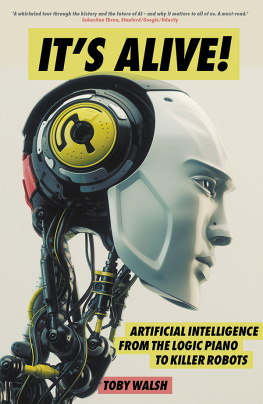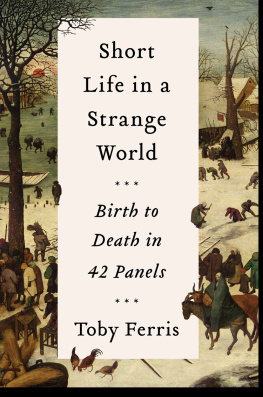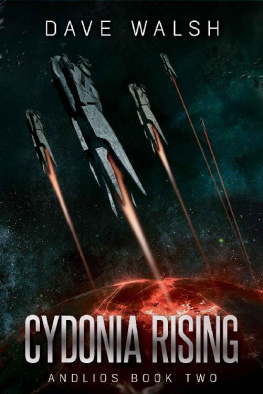Toby Walsh - 2062 : the world AI made
Here you can read online Toby Walsh - 2062 : the world AI made full text of the book (entire story) in english for free. Download pdf and epub, get meaning, cover and reviews about this ebook. year: 2018, genre: Romance novel. Description of the work, (preface) as well as reviews are available. Best literature library LitArk.com created for fans of good reading and offers a wide selection of genres:
Romance novel
Science fiction
Adventure
Detective
Science
History
Home and family
Prose
Art
Politics
Computer
Non-fiction
Religion
Business
Children
Humor
Choose a favorite category and find really read worthwhile books. Enjoy immersion in the world of imagination, feel the emotions of the characters or learn something new for yourself, make an fascinating discovery.
- Book:2062 : the world AI made
- Author:
- Genre:
- Year:2018
- Rating:3 / 5
- Favourites:Add to favourites
- Your mark:
- 60
- 1
- 2
- 3
- 4
- 5
2062 : the world AI made: summary, description and annotation
We offer to read an annotation, description, summary or preface (depends on what the author of the book "2062 : the world AI made" wrote himself). If you haven't found the necessary information about the book — write in the comments, we will try to find it.
Toby Walsh: author's other books
Who wrote 2062 : the world AI made? Find out the surname, the name of the author of the book and a list of all author's works by series.
2062 : the world AI made — read online for free the complete book (whole text) full work
Below is the text of the book, divided by pages. System saving the place of the last page read, allows you to conveniently read the book "2062 : the world AI made" online for free, without having to search again every time where you left off. Put a bookmark, and you can go to the page where you finished reading at any time.
Font size:
Interval:
Bookmark:
TOBY WALSH is one of the worlds leading experts in artificial intelligence, and has spent his life dreaming about and researching how machines might think. He is Scientia Professor of AI at the University of New South Wales and a Fellow of the Australian Academy of Science. Toby is a passionate advocate for limits that ensure AI is used to improve, not hurt, our lives. His last book, Its Alive! Artificial Intelligence from the Logic Piano to Killer Robots, was named by the New Statesman as one of its books of the year. Toby is a regular contributor to American Scientist, New Scientist and The Guardian.
PRAISE FOR 2062
As Toby Walsh convincingly puts it, the golden age of philosophy is just about to begin a testament to both the richness and the urgency of the questions that confront us between now and 2062. This is a compelling invitation to imagine the future we want, and a lively provocation to make it happen.
Brian Christian, author of The Most Human Human and co-author of Algorithms to Live By
If you want to explore what the disruptive future shaped by AI could be, read this book.
James Canton, CEO of the Institute for Global Futures and author of Future Smart
One day, machines will surpass humans in all forms of general intelligence. When will that happen? The answer, according to a survey of experts, is the year 2062. If you want to read a lively and well-informed speculation about what could happen next, you cant do better than Toby Walshs amazing new book.
Erik Brynjolfsson, professor at MIT and co-author of The Second Machine Age
Clarity and sanity in a world full of fog and uncertainty a timely book about the race to remain human.
Richard Watson, author of Digital VS Human and futurist-in-residence at the Imperial College, London
What happens next? is the question that drives human curiosity and innovation. In 2062, Walsh asks that question of one of the most critical junctures on our horizon the point at which machines become as intelligent as humans. If youre looking for a road map to help navigate that future, look no further.
Joel Werner, broadcaster and science journalist
One of the deepest questions facing humanity, pondered by a mind well and truly up to the task. Rip in!
Adam Spencer, broadcaster

Published by La Trobe University Press in conjunction with Black Inc.
Level 1, 221 Drummond Street
Carlton VIC 3053, Australia
www.blackincbooks.com
www.latrobeuniversitypress.com.au
La Trobe University plays an integral role in Australias public intellectual life, and is recognised globally for its research excellence and commitment to ideas and debate. La Trobe University Press publishes books of high intellectual quality, aimed at general readers. Titles range across the humanities and sciences, and are written by distinguished and innovative scholars. La Trobe University Press books are produced in conjunction with Black Inc., an independent Australian publishing house. The members of the LTUP Editorial Board are Vice-Chancellors Fellows Emeritus Professor Robert Manne and Dr Elizabeth Finkel, and Morry Schwartz and Chris Feik of Black Inc.
Copyright Toby Walsh 2018
Toby Walsh asserts his right to be known as the author of this work.
ALL RIGHTS RESERVED.
No part of this publication may be reproduced, stored in a retrieval system, or transmitted in any form by any means electronic, mechanical, photocopying, recording or otherwise without the prior consent of the publishers.
9781760640514 (paperback)
9781743820254 (ebook)

Cover design by Kim Ferguson
Text design and typesetting by Marilyn de Castro
To A and B,
who make my life so complete
0001
HOMO DIGITALIS
H umans are remarkable. Indeed, despite the abundance of life on the planet, we are perhaps the most remarkable species ever to inhabit it. We have reversed rivers, built islands and generally bent nature to our ways. We have constructed buildings that amaze. The monumental pyramids at Giza. The sprawling Great Wall of China. The stunning Sagrada Famlia. We have crossed the hottest deserts, and climbed the highest mountains. We have sent a roadster into space. We have even left the Earth to walk on the Moon.
We have created scientific theories that explain the mysteries of the universe from milliseconds after its birth 13 billion years ago, until its eventual death 1 googol years in the future. tamed fire, eradicated smallpox and banded together to overthrow despots and dictators. We have created art so sublime that it moves people to tears. The glorious melodies of Bachs St Matthew Passion. The naked beauty of Michelangelos David. The haunting sadness of the Taj Mahal.
But despite all these marvellous achievements, we will soon be replaced. Almost all traces of Homo sapiens will be erased from the Earth, just like almost all traces of our predecessor Homo neanderthalensis have gone. For evolution never stops.
Around 50,000 years ago, Homo neanderthalensis was no match for the rise of Homo sapiens. We dont know precisely when or how the Neanderthals died out. It might have been their failure to adapt to a changing climate a problem that ought to echo loudly to us today. Or it might be that Homo sapiens outcompeted them and left them no ecological niche in which to survive.
Whatever it was, the Neanderthals clearly did die out, and were replaced by us. Like every species before us, we too will be replaced by a new and more successful one. And as were smart dont forget that sapiens, or wise, is actually part of our species name we can even predict who that successor will be.
Our successor is Homo digitalis the evolution of the genus Homo into digital form. Both what we do and where we do it will become increasingly, and in some cases exclusively, digital. Human thought will be replaced by digital thought. And human activity in the real world will be supplanted by digital activity in artificial and virtual worlds. This is our artificially intelligent future.
My last book told the story of artificial intelligence (AI), starting with the ancient Greeks and finishing in about 45 years time, in 2062. It tells the story of where humankind will go in the century or two following the arrival of these thinking machines around 2062. It focuses not on the technology, but on us. It examines the impact that thinking machines will have on the human race.
We wont be talking about the technology of 100 or 200 years time. As Arthur C. Clarke would have said, technology that far into the future will simply sound magical. What is more important is what we do with this technology, for it will be the most powerful magic ever invented.
THE RISE OF HOMO SAPIENS
Why did we, Homo sapiens, become so successful? Why are we the ones who, for better or worse, dominate this planet? Why did Homo sapiens replace Homo neanderthalensis?
The Neanderthals werent so different from us. They shared some 99.7 per cent of our DNA. They were a little shorter and stockier than us, which gave them a smaller surface-to-volume ratio and meant they were better adapted to a seasonal climate. And despite the myth about their intelligence, they actually had larger brains than us. When you adjust for our differing body sizes, the Neanderthals brain was proportionally quite comparable to that of
Next pageFont size:
Interval:
Bookmark:
Similar books «2062 : the world AI made»
Look at similar books to 2062 : the world AI made. We have selected literature similar in name and meaning in the hope of providing readers with more options to find new, interesting, not yet read works.
Discussion, reviews of the book 2062 : the world AI made and just readers' own opinions. Leave your comments, write what you think about the work, its meaning or the main characters. Specify what exactly you liked and what you didn't like, and why you think so.

